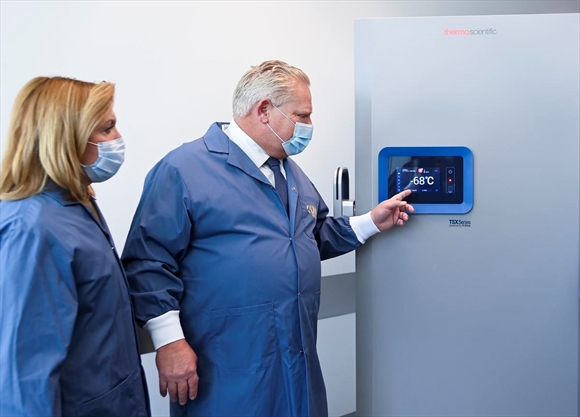Ontario will give people who complete their proof of vaccination in case they need it to travel, to work or to go to the movies, Health Minister Christine Elliott says.
With the first vaccine shipment expected this month, Elliott promised a new public communications campaign to educate people on all aspects of the vaccinations, including why it’s important to get them and potential side effects.
There will also be a system to keep track of who gets the first primer shot to make sure they return for the booster a few weeks later.

While the vaccine will be voluntary, Elliott said Ontarians should be aware it may become a requirement for travel on airplanes, employment and other activities where there is close contact with others, given the highly contagious nature of the virus.
has infected at least 131,000 Ontarians and killed 3,808 in the province, with a record 16,151 residents now fighting active cases after testing positive in the last 14 days.
“There may be some restrictions that may be placed on people that don’t have vaccinations, for travel purposes, to be able to go to theatres and other places,” Elliott said Tuesday.
“That will be essential for people to have.”
The communications campaign will also be aimed at helping people who may be hesitant to make a decision for whatever reason, such as the rapid development or concerns it is new. .
“Some people want the vaccine but they don’t want to be first. That’s where it’s important for us to have a public campaign on awareness.”
Liberal House Leader John Fraser said communications will have to be much better than the flu shot effort this fall, where heavy demand outpaced deliveries and resulted in some pharmacies cancelling appointments because they ran out of vaccine.
“Ontarians will need clear and consistent communication to know what to expect,” Fraser added. “This means setting targets and showing your progress.”
Phase one of the vaccination effort will focus on residents, staff and essential caregivers at nursing homes, retirement homes and other congregate living situations like group homes, health-care workers such as hospital employees, Indigenous communities and people receiving home health care for chronic conditions.
That means most Ontarians won’t start getting shots until April, when phase two is expected to begin. There are no approved vaccines yet for those under the age of 18.
The first shipment is coming from Pfizer, with locations for injections to be announced soon but likely to be at a few of the 21 hospitals with ultracold freezers need to keep the vaccines at about -80C.
Elliott said the drug company will ship boxes of the vaccine directly to hospitals the government chooses, which will be “in the areas of the greatest need,” such as the GTA hot zones for transmission of the virus.
Locations will be announced soon, and people on the priority list will have to go to the central vaccination sites.
The government has warned that nursing home residents may have to wait until a second and more stable vaccine from Moderna is approved and ready because Pfizer has advised too much jostling of the medicine can reduce its effectiveness, meaning it cannot be taken directly into long-term care facilities
“They shouldn’t be moved more than once,” Elliott said, rejecting long-term care homes as initial deployment sites for the Pfizer vaccine because they don’t have deep freeze capability.
Rob Ferguson is a Toronto-based reporter covering Ontario politics for the Star. Follow him on Twitter:
